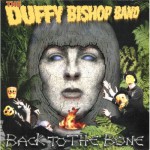 Duffy Bishop Band
Duffy Bishop Band
Back To The Bone
Burnside Records
R&B veteran Bishop and her crack back up band have been beating the pavement on I-5 between Seattle and Portland with such regularity over the past decade that potholes and speed traps are named after them. But this, their second Burnside outing (impeccably recorded in Portland at Dead Aunt Thelma’s studio by Mike Moore) serves as proof that those trips were not made in vain.
Fourteen of the sixteen songs were penned by the band, They range from the soul-flavored “Damn Blues,” where Duffy calls to mind Lydia Pense, while backed by the whip streetsmart guitar interjections of Chris Carlson and Henry Cooper and the tasty Hammond phrasings of guest Norm Bellas; to the Joplinesque approach Bishop takes on “Convince Me,” to the torch ballad “Thinking,” which acts as the perfect showcase for her smoky contralto delivery.
Her country send-up, “Buzzin'” falls a little flat, if only for the fact that Duffy sounds a little too knowing, a little too smart to be cast in the role of hayseed farm gal. Likewise, the roadhouse swing of “First Thing Smokin’ seems to be little more than a harmless diversion between meatier songs. But when set loose upon a smoldering piece of Southern style blues, such as “Growing Old,” Duffy elicits every nasty nuance, summons each devilish detail with expert grit and cool efficiency.
And she handles with panache the weird calypso of “Old Dog,” recalling the hoarse dusky intonation of 80s pop songstress Martha Davis of the Motels. “Get Back To The Bone” moves at a Bonnie Raitt gait, replete with smokin’ slide guitar and shuffling rhythm. But Duffy proves that there’s a big difference in vocal approach. Whereas Raitt might coyly cajole a tune, Bishop cuts through a song like a carbide blade sawing through steel-reinforced concrete.
The gospel tinged “Daughter’s Lament,” is a fine vehicle for the aching qualities in her voice, A nice chord change at the turnaround elevates the tune above the mundane. Cooper’s inspired harmonica work adds an appealing touch to the arrangement. And “How Can I Forgive Him,” delves into anthropological connundra (while creating a grammatical quagmire): “How can I forgive him/And I cain’t forgive her?” A snarling guitar solo enlivens the break, while Duffy ponders her dilemma: “She’s no more guilty than he ever was/But I cain’t forgive her…just because.” Well, there you go.
An underlying reggae feel invests the quizzical “Prize Fighter,” a low key number with a gospel heart. Duffy is in her element when blasting through the odd lyrics as if they were some kind radical geologic manifesto— “I won’t fight for money/I won’t fight for love/I won’t fight for shelter/ But I’ll fight the stars above/I won’t fight for morals/I won’t fight for birth/I won’t fight for causes/ But I’ll fight the spinning earth.” Stars above? Spinning earth? What’s up with that shit gang? Hey, I’ll fight to keep my electricity on and you get back to me on that war with the stars above, ‘kay?
“Friggy Diggy” lopes through the swamp like Jethro on two jugs of cornahol and a hankerin’ for crawfish; Duffy all over the vocal like grease in gumbo. Kinda tasty.
Perhaps the most thrilling cut of the bunch is Duffy’s uncanny take on Otis Redding with “More Than Words Can Say.” Her flawless presentation— searingly gutsy, nearly matches Redding in intensity and stands as the most authentically powerful Blues track ever recorded in the Northwest. Without a doubt. Her performance is truly a classic unto itself.
“Coming To A Party” is a familiarly innocuous hand-jive of little consequence (especially in light of what went before) but for the morbidly grim lyric depicting a party for the rapid decay of one’s corpse. Yahoo! Please pass the punch. Dog owners beware. Two startled dogs bark an alarmed entry onto the sonic premises a full minute or so after end of the merry custard dance. Mayhem will ensue in your household too. You have been warned.
The Duffy Bishop Band turn in a journeyman-like effort on Back To The Bone. While the original material sometimes varies in quality and often borders upon being inane, Duffy’s rendition of “More Than Words Can Say” is worth the price of admission. And after all, it’s Duffy’s band. Throughout this outing, she gives rise to the certainty that she has true star quality. A couple of hit songs and she’d be a household name. Her voice would take care of the rest.
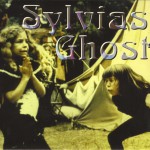 Sylvia’s Ghost
Sylvia’s Ghost
“My Little Shadow/Cliche Song”
Rainforest Records
Sylvia’s Ghost have garnered an evergrowing cadre of loyal followers. Typically, SG deliver thick, melodic EuroGoth— with a touch of brains and humor thrown in for flavor. The band creates lush aural landscapes while lead singer Billy James lends often haunting vocals.
A good case in point is “My Little Shadow.” Over a Kenneth Bancroft’s bed of synthstrings and random samples stampede an army of droning guitars, led by Ken Westin and bassist Michael Draper. And the entire scene sits in the lap of drummer Jason Mockley.
The band work so well in ensemble that they create orchestral textures beneath James’ ethereal vocals. This is great work, far outside that of the average local band. Few local bands choose to assume the rigors such dense sonic constellations require in their composition. The Ghosties pull it off with skill, creating something of an original sound at the same time.
As if to lighten the weight of the A side, the band toss off the cheery B side, “Cliché Song,” with uncharacteristic frivolity. Draper leads the way with a vaguely familiar grungy bassline, while Mockley provides the pocket and Westin the chunky rhythm guitar. Billy recites the uh, cliché ridden lyrics with a heavy measure of sarcasm, leading up to the raucous chorus. A cool song, deserving of airtime on anybody’s stereo. You can remember the whole thing after one pass. The practiced amongst you will be singing along by the second verse, upon even a first hearing. I’m not sure if it’s a hit, but it’s certainly unforgettable.
This nicely packaged, expertly produced single would be a welcome addition to any serious collection of local product. Sylvia’s Ghost are a musical presence with which to be reckoned. They are different enough to stand apart, yet friendly enough as to not seem remote or aloof. An air of mystery and convocation pervades and endures.
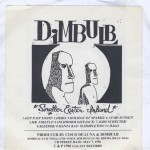 Dimbulb
Dimbulb
Smaller Easter Island
Galaxy Records
Dimbulb present a tight, heavy three-piece sound, perhaps vaguely reminiscent of Skiploader (I believe the Portland Sound may be congealing. This is not the first time I’ve noted this correlation). Heavy on the bass chord riffage and twisting guitar phrases, vocalist/ guitarist Nate Snell blends intrinsically with bassist Billy’s thick, motile articulations.
“Out Past Sight” reveals those characteristics. A bracing chord progression drives “Hero” with definitive force. Further significant bass/guitar interplay is evidenced in the turnarounds, though tight without. And the eight-note chatter of the middle is a wondrous thing to behold. Sustained, yet restrained. A very cool song.
Billy initiates “Holiday Of Sparks,” fingerpicking a clever bassline as drummer Rob Duncan Jr. enters with a ticking time bomb of a beat. Laid back and atmospheric, the song succeeds in a transitional role. “Atari Sunset” showcases Snell’s riffage factor— jagged, two-note lines break into thundering bar chords at the drop of a downstroke.
Another memorable cut is “Mr. Firefly.” A focused presentation, cleanly delineated, with a yearningly distinct chorus, etches this tune in the brain. “Inchworm Distance,” has its antecedent in the first cut, though Duncan’s punchy kick-work propels this cut with a little more power. A well thought out middle section elevates it above its predecessor. An exemplary arrangement, masterfully executed.
An ominous foreboding falls like fog upon “Jody Schecter,” a song of regret and bitterness— Snell’s wrenching sobs of guitar tears evoke a sad, roiling turmoil of unrequited love, anger and frustration. The emotion in this song is palpable and real. A heartbreak.
The user-friendly, crunchy jangle of “Sleeper” beckons the listener into the song. And it rides the energy of the chord progression into Snell’s nicely rendered, octave embracing solo flight. The Police would seem to be watching over the structure of “Manta Ray,” a thoroughly modern incorporation of Andy Summers’ guitar modulations and Stuart Copland’s rousing snare— updated around a lively chorus: “Don’t quit your day job,” delivered over a complex, skipping chord run.
“Simpleton” combines Snell’s penchant for bending up from notes, with his knack for the construction of tight, cohesive pop songs. “Halo” might echo Kurt Cobain in its conversational simplicity and explosive nature. A very pretty fade out the scene. Be that as it may, it does not raise the track from its status as weakest of the lot.
Dimbulb do not lack for merit. They are a band of many bright possibilities. If Snell can concentrate on taking his vocals to the next level, a place at which he sometimes arrives here (as on “Jody Schecter’), it would seem likely that Dimbulb could shine brightly for a long time to come.
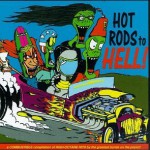 Various Artists
Various Artists
Hot Rods To Hell
Blood Red Vinyl & Discs
For a very brief time, about forty years ago, there was a hot rod craze in music, spearheaded by the musical genius of Robert Mitchum and his exciting composition “Thunder Road” (which became the movie of the same name— or vis versa). Another song, “Leadfoot” made by some guy whose name has been sucked up by the quicksand of time, kind of perpetuated the genre before it petered out altogether at the wimpy hands of the Wilson braintrust with the early, pre-surf Beach Boys. Blow it out GTO!
Anyway, capitalizing somewhat on the cult status of Surf music, the good people at Blood Red have amassed a credible cast of characters to recall the halcyon days of yesteryear, when cars were dangerous and sexy and mileage was something you got out of the backseat. Well…. almost. These are mostly Surf bands playing Surf beat. Closer to the Beachboys than Robert Mitchum.
Surf is well represented among the contestants. Satan’s Pilgrims, The Surf Trio and The Surfdusters all contribute a song to the compilation. But the theme is automotive, whether it’s the Pilgrims’ “My Woodie” or the “Woodies'” “Midnight Rider.
The Exotics’ groovy instrumental “The Corrido Twist” kicks off the set, heavily reverbed, sustainless guitar carries the melody. “Satan”s Pilgrims” up the ante with a patented instrumental in “My Woodie.” The Surf Trio’s “Custom Caravan” has more in common with the Ramones than with the Hondells. Mark Brodie and the Beaver Patrol go after the Dick Dale/ Duane Eddy Twang thang, with reasonable success on “Suspense Run.” “Hot Rod Alley” by the Surfdusters harkens to the golden days of rock instrumentals, calling to mind the Ventures, the Chantays and the Tornadoes among several others. Pretty authentic. Likewise, the Farfisa laden plunk of the Boss Martians’ “Competition Coupe” aptly captures the spirit and excitement of a Junior High Sock Hop circa 1962.
The Bomboras make a big splash with their campy cult classic “The Outlaw.” The cut fairly drips with authenticity (it’s even recorded in mono to give the buzzy guitar total lo-fi compression). A standout track. The Woodies follow suit with guitars ooze reverb from every orifice on “Midnight Rider.” With “RPM,” The Trashmatics probably do the best job at approximating the essentially grand wimpiness of the classic Beach Boy era of cars songs— cheesy organ, whiny, adenoidal vocals, annoyingly incomprehensible, motorhead lyrics. The Trashmatics have it all, embodied in an original 60s sort of sound.
Hot Rods To Hell is great fun. The contributing bands offer varied perspectives into the realm of Surf/Hot Rod/Instrumental themes; some by maintaining an extremely high level of authenticity, others by pushing the envelope of the genre. Still, anyone interested in the aforementioned styles of music will find a lot to enjoy in this collection.
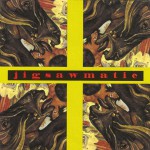 Jigsawmatic
Jigsawmatic
Jigsawmatic
Self-Produced
Recorded in a day last Spring, these four songs introduce a band who seem conscious of dynamics and diversity while adhering to the basic broad-stroked structure of Northwest rock (Nirvana, Everclear, et al). Vocalist Jack Houston has a properly snotty voice, snide around the edges. He and fellow guitarist Darrick Eisenach generate a fairly dense plane while drummer Michael Nelson and bassist Matt Tracy hold down the beat with solid efficiency.
“Swerve” drives hard, sliding on the shoulders, throwing gravel in all directions with barely restrained abandon. Houston’s jagged vocals capture the rebellious spirit of the song. Tracy’s tasty bass arpeggios sustain “Stupid Fad,” a perilous tale of the wasted lives of useless fools who blindly follow like sheep behind a Judas goat. Eisenach interjects a slicing solo in the middle. But Houston’s vocal is the focus. Something curiously affecting assures his thin, sneering jibes. And his scream of anguish at the end of the song is a classic worth of even Roger Daltry in his prime. A cool song.
“Nirvana” jumps across several thematic streams without fully floating down any one. The song lacks cohesion, while sustaining a high level of musicianship and implementation. Conversely, “Down” springs right into a tight fisted groove, that seems better suited to Houston’s gritty vocals. Eisenach again rises to the occasion with a well-crafted extended guitar solo.
There’s something arresting in Jigsawmatic. Jack Houston has the kind of voice and personae that can worm its way into the consciousness with slow persistence. The band is tight, if perhaps somewhat lacking in a complete sound all their own. Still, their component parts seem solid and made to last. There is good reason to think that we may be hearing more from Jigsawmatic in the near future.
